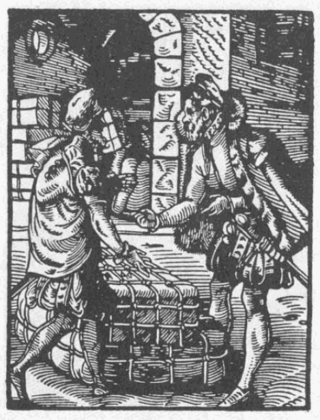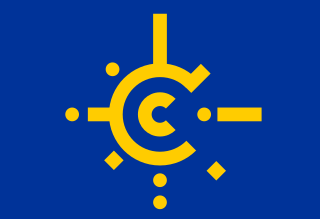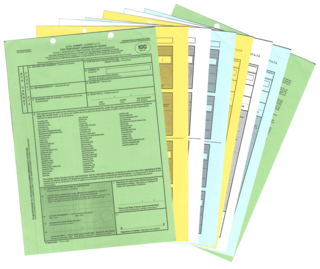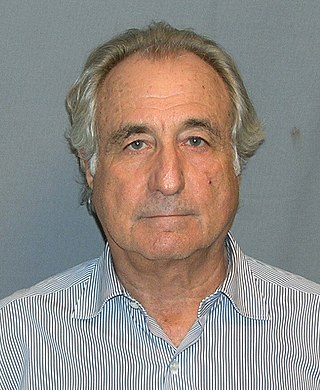
Trade involves the transfer of goods and services from one person or entity to another, often in exchange for money. Economists refer to a system or network that allows trade as a market.

The World Trade Organization (WTO) is an intergovernmental organization that regulates and facilitates international trade. With effective cooperation in the United Nations System, governments use the organization to establish, revise, and enforce the rules that govern international trade. It officially commenced operations on 1 January 1995, pursuant to the 1994 Marrakesh Agreement, thus replacing the General Agreement on Tariffs and Trade (GATT) that had been established in 1948. The WTO is the world's largest international economic organization, with 164 member states representing over 98% of global trade and global GDP.

A stock market, equity market, or share market is the aggregation of buyers and sellers of stocks, which represent ownership claims on businesses; these may include securities listed on a public stock exchange, as well as stock that is only traded privately, such as shares of private companies which are sold to investors through equity crowdfunding platforms. Investment is usually made with an investment strategy in mind.

Customs is an authority or agency in a country responsible for collecting tariffs and for controlling the flow of goods, including animals, transports, personal effects, and hazardous items, into and out of a country. Traditionally, customs has been considered as the fiscal subject that charges customs duties and other taxes on import and export. In recent decades, the views on the functions of customs have considerably expanded and now covers three basic issues: taxation, security, and trade facilitation.

ASEAN, officially the Association of Southeast Asian Nations, is a political and economic union of 10 member states in Southeast Asia, which promotes intergovernmental cooperation and facilitates economic, political, security, military, educational, and sociocultural integration between its members and countries in the Asia-Pacific. The union has a total area of 4,522,518 km2 (1,746,154 sq mi) and an estimated total population of about 668 million, containing approximately 8.5 % of the world population in 2021. ASEAN generated a purchasing power parity (PPP) gross domestic product (GDP) of around US$10.2 trillion in 2022, constituting approximately 6.5 per cent of global GDP (PPP).

The World Customs Organization (WCO) is an intergovernmental organization headquartered in Brussels, Belgium. The WCO works on customs-related matters including the development of international conventions, instruments, and tools on topics such as commodity classification, valuation, rules of origin, collection of customs revenue, supply chain security, international trade facilitation, customs enforcement activities, combating counterfeiting in support of intellectual property rights (IPR), illegal drug enforcement, combating counterfeiting of medicinal drugs, illegal weapons trading, integrity promotion, and delivering sustainable capacity building to assist with customs reforms and modernization. The WCO maintains the international Harmonized System (HS) goods nomenclature, and administers the technical aspects of the World Trade Organization (WTO) Agreements on Customs Valuation and Rules of Origin.
Free economic zones (FEZ), free economic territories (FETs) or free zones (FZ) are a class of special economic zone (SEZ) designated by the trade and commerce administrations of various countries. The term is used to designate areas in which companies are taxed very lightly or not at all to encourage economic activity. The taxation rules and duties are determined by each country. The World Trade Organization (WTO) Agreement on Subsidies and Countervailing Measures (SCM) has content on the conditions and benefits of free zones.

The Central European Free Trade Agreement (CEFTA) is an international trade agreement between countries mostly located in Southeastern Europe. Founded by representatives of Poland, Hungary and Czechoslovakia, CEFTA expanded to Albania, Bosnia and Herzegovina, Bulgaria, Croatia, Moldova, Montenegro, North Macedonia, Romania, Serbia, Slovenia and the UNMIK.
A free-trade agreement (FTA) or treaty is an agreement according to international law to form a free-trade area between the cooperating states. There are two types of trade agreements: bilateral and multilateral. Bilateral trade agreements occur when two countries agree to loosen trade restrictions between the two of them, generally to expand business opportunities. Multilateral trade agreements are agreements among three or more countries, and are the most difficult to negotiate and agree.
Supply chain security activities aim to enhance the security of the supply chain or value chain, the transport and logistics systems for the world's cargo and to "facilitate legitimate trade". Their objective is to combine traditional practices of supply-chain management with the security requirements driven by threats such as terrorism, piracy, and theft.
Pluto Press is a British independent book publisher based in London, founded in 1969. Originally, it was the publishing arm of the International Socialists, until it changed hands and was replaced by Bookmarks.

Trade facilitation looks at how procedures and controls governing the movement of goods across national borders can be improved to reduce associated cost burdens and maximise efficiency while safeguarding legitimate regulatory objectives. Business costs may be a direct function of collecting information and submitting declarations or an indirect consequence of border checks in the form of delays and associated time penalties, forgone business opportunities and reduced competitiveness.
The single-window system or single-window concept is a trade facilitation concept which allows an international (cross-border) trader to submit information to a single agency, rather than having to deal with multiple agencies in multiple locations to obtain the necessary papers, permits, and clearances to complete their import or export processes. There is an obvious time saving benefit to the single window system. The concept is recognised by organisations such as the United Nations Economic Commission for Europe (UNECE) and its Centre for Trade Facilitation and Electronic Business (UN/CEFACT), World Customs Organization (WCO), the United Nations Network of Experts for Paperless Trade and Transport in Asia and the Pacific (UNNExT), and the Association of Southeast Asian Nations (ASEAN).

The ATA Carnet, often referred to as the "Passport for goods", is an international customs document that permits the tax-free and duty-free temporary export and import of nonperishable goods for up to one year. It consists of unified customs declaration forms which are prepared ready to use at every border crossing point. It is a globally accepted guarantee for customs duties and taxes which can replace the security deposit required by each customs authority. It can be used in multiple countries in multiple trips up to its one-year validity. The acronym ATA is a combination of French and English terms "Admission Temporaire/Temporary Admission". The ATA carnet is now the document most widely used by the business community for international operations involving temporary admission of goods.

A periodical literature is a published work that appears in a new edition on a regular schedule. The most familiar example is a newspaper, but a magazine or a journal are also examples of periodicals. These publications cover a wide variety of topics, from academic, technical, trade, and general interest to leisure and entertainment.
John Sullivan Wilson is a former Lead Economist (retired) of the World Bank. He directed and managed research on transparency, trade facilitation, regulation, and economic development. Mr. Wilson served in the Development Research Group of the World Bank and also in operations in the Infrastructure Vice Presidency.

The Madoff investment scandal was a major case of stock and securities fraud discovered in late 2008. In December of that year, Bernie Madoff, the former NASDAQ chairman and founder of the Wall Street firm Bernard L. Madoff Investment Securities LLC, admitted that the wealth management arm of his business was an elaborate multi-billion-dollar Ponzi scheme.

GreyNet International, the Grey Literature Network Service is an independent organization founded in 1992. It is dedicated to research, publication, open access, education, and bringing public awareness to grey literature. Grey literature is often defined as "information produced and distributed on all levels of government, academics, business and industry in electronic and print formats not controlled by commercial publishing i.e. where publishing is not the primary activity of the producing body.".

Kunio Mikuriya is the Secretary General of the World Customs Organization (WCO).
The Bali Package is a trade agreement resulting from the Ninth Ministerial Conference of the World Trade Organization in Bali, Indonesia on 3–7 December 2013. It is aimed at lowering global trade barriers and is the first agreement reached through the WTO that is approved by all its members. The package forms part of the Doha Development Round, which started in 2001.












